Soft Tissue Therapies / manual therapy
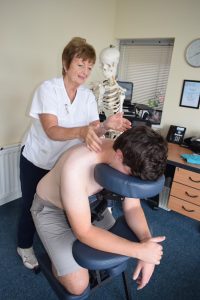

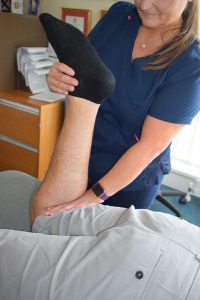
At Bangor Physiotherapy we thieve on hand’s on techniques in both the diagnosis and treatment of many conditions and patients benefit. The techniques used depends on the type of injury and the most effective treatment. We use manual therapy techniques in conjunction with other treatment modalities such as electrotherapy, acupuncture, specific exercises / rehabilitation programmes and self-management advice. Types of manual therapy techniques include: Therapeutic massage, joint manipulations and mobilisation, soft tissue mobilisation, trigger point therapy, soft tissue stretching and release techniques. We use Maitland, Mulligan and McKenzie concepts, but the best are the techniques and the ones people enjoy most are the ones we have developed over many years of helping patients to recover.
Therapeutic Massage


Therapeutic massage is renowned for its healing and rejuvenating properties and uses a range of techniques. Bangor Physiotherapists use massage which is remedial to the condition. Therapeutic massage works to release muscle tension and spasms and has great healing benefits including increased flexibility and increased range of movement. Massage helps to improve circulation, promote healing, introduce oxygen, remove waste products, maintain healthy muscle and encourages improved recovery. It also enables us to palpate tissues which helps with diagnosis, decrease pain, reduced muscle spasm/tension, reduce swelling and breakdown of scar tissue. Patients feel much better with our type of medical massage.
Manipulation and mobilisation
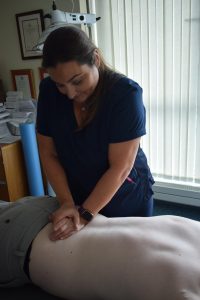
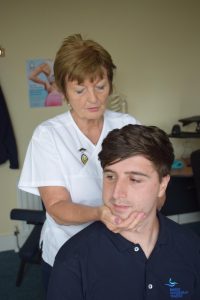


All the physios at Bangor Physio have taken additional post graduate training in techniques including manipulation and mobilisation. Joint manipulation is one of the most popular techniques of providing greater range of movement and pain relief to patients who have joint dysfunction. Manipulation and mobilisation are used to improve the mobility and function of your joints which can reduce stiffness and pain and increase range of movement and function. We carry out this technique safely and comfortably for patients who love to regain freedom of movement in tissues and joints. We teach you how to self-mobilise painlessly and maintain improved normal range movement following mobilising treatment.
Post-surgical rehabilitation
Post-surgical rehabilitation may be necessary for a variety of surgical procedures but mainly orthopaedic surgery. All types of surgery present with a number of post-operative consequences which can be helped with physiotherapy. Sports injury rehabilitation or ‘rehab’ is a structured programme designed by physiotherapists restoring full function as soon as possible encouraging a faster recovery and return to sport by strengthening weakened muscle groups, reducing any pain and inflammation and helping to minimise the risk of future injuries by improving muscle action and tone, stamina, flexibility, balance and coordination.
Specific remedial and rehabilitative exercise

At Bangor physio we have a large well-equipped rehabilitation gymnasium. Rehabilitation is a specialised area of musculoskeletal (MSK) physiotherapy, which helps patients regain normal function after injury or surgery and return to their normal everyday activities or sport. Our experienced physiotherapists are able to support your rehabilitation, from the early stages of injury and before and after surgery, and as it progresses to achieving full recovery and match fitness.
Electrotherapy
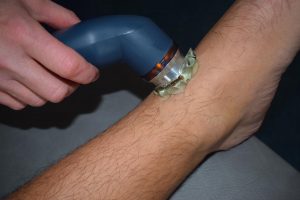
Electrotherapy is the application of an electric current, sound wave, or heat ray to the affected area of the body to accelerate healing and reduce inflammation swelling and pain. Electrotherapy is used as an adjunct to treatment to treat a variety of conditions. At Bangor physiotherapy we use Ultrasound, Laser and Infra-red treatments.
Acupuncture



Acupuncture treatment is carried out by our physiotherapists at Bangor Physiotherapy, who have undergone specialist training and are members of the Acupuncture Association of Chartered Physiotherapists (AACP). Acupuncture is a form of therapy in which fine needles are inserted into specific parts of the body and is used as part of our physiotherapy treatment to reduce pain and stimulate the healing process and enhance rehabilitation. Acupuncture including dry needling techniques within physiotherapy is used with a background of clinical and research evidence
K-Taping

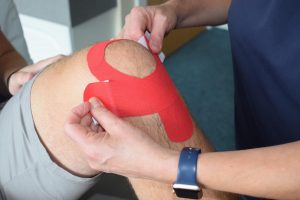
Kinesiology taping (KT)s a therapeutic tool that speeds up recovery from injury and improves fitness. It is a coloured tape that is applied on both the injury site and nearby lymphatic system and assists in both prevention and treatment of injuries. We use it as an adjunct to treatment to help alleviate pain and improve the healing in soft tissues. There are many proposed benefits to K Tape, including: proprioceptive facilitation, reduced muscle fatigue, muscle facilitation, reduced delayed-onset muscle soreness, pain inhibition, enhanced healing. Taping provides support for injured tissues, reduces oedema, improves lymphatic drainage and increases circulation.
Self-management advice

Alongside all our manual therapy techniques and exercise programmes all of our treatment approaches incorporate education and advice to empower the patient to enable them to learn how to self-manage their condition so they can fulfil their quality of life and help prevent further injuries with less reliance on medical interventions. If conditions are adequately managed from the onset self-management techniques can prevent a problem becoming chronic and disabling.
Elderly Rehabilitation
The rehabilitation is a subject dear to our hearts as a caring family and practice. We consider it a very important aspect of our work at Bangor Physiotherapy where we strive to prevent the co-morbidities of the aging process and their effects on specific problems such as arthritis, frozen shoulder, neuropathies, and cardiovascular disease, and dementia. Our treatments take the form of “hands on” treatment to decrease pain, improve range of movement and function and improve the general health and ability of elderly individuals. We work with elderly patients and families to help optimise quality and enjoyment of life. The benefits of physiotherapy for elderly patients includes regaining independence, restoring confidence, improving mobility and muscle strength, balance and walking re-education and reducing the risk of falling. We can advise and assist with blue badge application and attendance allowance applications.
Neurological Rehabilitation
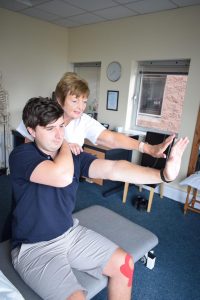
At Bangor Physiotherapy we treat Stroke, Parkinson’s Disease, Multiple Sclerosis in adults and also children with Cerebral Palsy and similar problems and many other neurological conditions. As many of these conditions may be chronic, we plan “hands on” treatment, along with rehabilitation in the gymnasium, walking re-education, balance, co-ordination routines, chair exercises, body rhythm and co-ordination exercises to suit the patient’s needs. We emphasise self-management advice and include family participation in the rehabilitation programme over time, sometimes during a lifetime. Sometimes there is an overlap with other conditions so treatment may be neuro/musculo/skeletal in nature. Patient’s benefit from knowing we are here for advice when necessary as neurological problems arise and need explained. We can usually reassure, treat if necessary, and refer for more neurological advice, medication or opinion if necessary.
Epley manoeuvre


At Bangor Physio we have completed additional training in the Epley manoeuvre. The Epley Manoeuvre is used to treat Benign Paroxysmal Positional Vertigo (BPPV). It is a safe and gentle procedure that works by allowing free floating particles from the ear canal (which causes the sensation of vertigo) to be relocated using gravity. It can be very successful in the treatment of BPPV with immediate results.
Gait and Posture Analysis



A basic analysis of a patient’s gait and posture provides information about the alignment and weight bearing structures of body and the capability of the musculoskeletal system to adjust to physical stressors. An understanding of normal gait and posture is essential for identifying and treating musculoskeletal pain. This information reveals common musculoskeletal conditions and their association with the abnormal gait and posture as it presents. There are several symptoms or conditions that may require a biomechanical assessment including flat feet with dropped arches, lower limb pain exhibited with walking and running, foot drop, hip hitching, a waddling or shuffling gait or and an overall abnormal walking pattern. We work closely with podiatrists who may also be able to assist the problem by providing orthotics and along with our physiotherapy routines, daily exercise programme and self-management routines and re-educated walking pattern.
Bike fit Assessments
Bike fit is a process of adjusting a bike for a cyclist to optimize their comfort, performance and efficiency. A detailed assessment of the cyclist and bike aims to provide adjustments that can help in reducing injuries, increase efficiency, comfort and improve performance for all cyclists.
Pilates
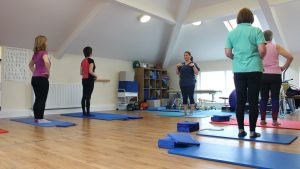

At Bangor Physio we run physio led Pilates taken by qualified physiotherapists trained by APPI (Australian Physiotherapy Pilates Institute). Our classes are small, flexible, fun and suitable for most abilities. Clinical Pilates is a form of physical exercise that focuses on posture, core stability, balance, control, strength, flexibility, and breathing and is used in conjunction with physiotherapy as a means of treating a variety of injuries, particularly those of the neck and back. These are great classes for improving strength and function following back injury and help prevent further injury and / or chronic conditions from developing.
Sports Massage

Sports Massage is a great adjunct to Physiotherapy. Sports massage uses various soft tissue therapies, mobilising routines, rehabilitative exercise advice programmes to assist in aiding recovery, promoting health and encourages muscle contraction which improves exercise tolerance
Display screen assessment



Susan Curran and Alice Pringle have a keen interest in Occupational Physiotherapy which is a specialist area of physiotherapy. They have both completed the relevant level of training and are members of ACPOHE (Association of Chartered Physiotherapists in Occupational Health and Ergonomics). They are Directors of their own subsidiary company ‘Physiofix Ergonomics’ taking the basic workplace assessment DSE to the next level, applying clinical knowledge to ensure that the working environment (either home, office or vehicle) is set up to the unique needs of each employee. They have gained a fantastic and reputable rapport with several Occupational Health companies who contract them to complete DSE assessments throughout Northern Ireland. If you wish to request more information about our ergonomic service, please email us on bangorphysiofix@gmail.com
Medico/legal Assessment and report writing
Bangor Physiotherapists belong to the Medico/Legal Association of Chartered Physiotherapists. We have experience over 40 years of report writing about injuries of whatever case whether industrial injuries or caused by road traffic collision or other accidents or due to clinical negligence. We report for patients who are adults and on behalf of children. We can write up your history to prepare a medico/legal report, attend meetings with solicitors or attend court on if necessary. We enjoy a good relationship with our legal colleagues who often request liability or quantum reports pricing out the cost of residual disability following injury, and we have experience with the Scott Directives for discussion with other medico/legal experts when agreeing a joint report for court.
Domiciliary Physiotherapy
We are able to provide physiotherapy in your own home if you are unable to attend the practice for physiotherapy. Please phone the practice to enquire about this service. This service may suit patients unable to come to the practice because of illness, stroke, other disability or post-operatively. We can visit you in a Nursing or Care Home if necessary. There is an additional charge for domiciliary calls


